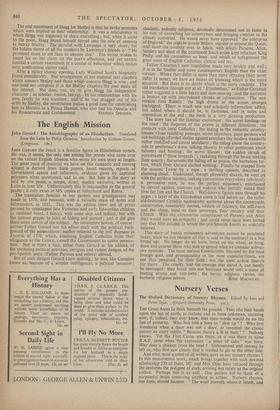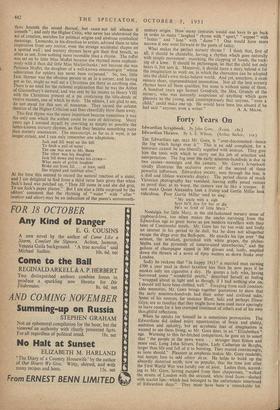Nursery Verses
The Oxford Dictionary of Nursery Rhymes. Edited by Iona and Peter Opie. (Oxford University Press. 3os.) THE Great Anon lie thick beneath the ground. They rest their heads upon the lap of earth, to fortune and to fame unknown, uncaring now, if, indeed, they ever knew, that their words would be on the lips of posterity. Who first told a bore to "shut up" ? Who first wondered when a door was not a door, or invented the classic answer to every riddle, " Because, there's a B in both" ? Nobody knows. , Yet the First Cause was there, as it was there in some R.A.F. mess when the expression "a piece of cake" was born. Why does a chicken cross the road ? Unhonoured and unsung he left us, who first saw clearly that it wanted to get to the other side.
And who, most quoted of all writers, gave its our nursery rhymes ? In this monumental work, which brings together with such devoted scholarship 550 of them, Mr. and Mrs. Opie have retraced through the centuries the pedigree of each, arriving but rarely at the original author. Perhaps this is as well. One prefers not to think of a purposeful brain contriving anything so artless. Nursery rhymes, one feels, should happen. "The wind bloweth where it listeth, and thou heareth the sound thereof, but canst not tell whence it cometh " ; and only the Higher Critic, who never has understood the act of creation, searches for political origins and abstruse symbolical meanings. Leonardo, in his direction to artists, advised them to take inspiration from any source, even the strange accidental shapes on" a spotted wall ; and nursery rhymes have got their first breath, as often as not, from nothing more recondite than a rhyme. The tuffet was sat on by little Miss Muffet because she rhymed more euphoni- ously with it than did little Miss Marjoribanks ; not because she was Patience Muffet, the daughter of a well-known entomologist "whose admiration for spiders has never been surpassed." So, too, little Jack Horner was the obvious person to sit in a corner, and having got so far, might as well eat a Christmas pie there as anything else. There is no need for the rational explanation that he was the Abbot of Glastonbury's steward, and was sent by his master to Henry VIII with the Christmas present of a pie containing the title-deeds of twelve manors, one of which he stole. The editors, I am glad to see, do not stand for this sort of nonsense. They record the solemn theories of the Higher Criticism and then cheerfully blow them away.
This first rhyme was the more important because sometimes it was the only one which the author could be sure of delivering. Many years ago I amused myself by rewriting as simply as possible the better-known nursery rhymes, so that they became something more than nursery assonances. The manuscript, as far as it went, is no longer extant, and I can only remember one adaptation: Jack and Jill went up the hill
To fetch a pail of water ;
'The one was son to Mr. Bunn
The other was his daughter.
Jack fell down and broke his crown— What peals of girlish laughter Broke out from Jill ... at least, until She tripped and tumbled after."
At the time this seemed to record the natural reaction of a sister, and I am delighted to find from a third verse here given that when Jack's head was patched up, "Then Jill came in and she did grin, To see Jack's paper plaster." But I am also a little surprised by the editors' comment that the rhyming of " water " with "after" (wahter and ahter) may be an indication of the poem's seventeenth- century origin. How'many centuries would one have to go back in order to make " laughed " rhyme with "sport," " supper " with " butter " and " lane " with " dame " ? One would have more success if one went forward to the poets of today.
What makes the perfect nursery rhyme ? I think that, first of all, it should be chantable, having a rhythm which goes naturally with simple movement: marching, the clapping of hands, the rock- ing of a knee. It should be picturesque, so that the child not only hears it, but sees it. Moreover, it should leave a story behind it for the imagination to work on, in which the characters can be adopted into the child's own make-believe world. And yet, somehow, it must remain sheer, unpremeditated moonshine. Not all the best nursery rhymes have all these qualities, but none is without some of them. A hundred years ago Samuel Goodrich, the Mrs. Grundy of the nursery, who was naturally suspicious of anything which gave pleasure to the young, said contemptuously that anyone, "even a child," could make one-up. He would have been less absurd if he






















































 Previous page
Previous page